Nylon Caster Wheels: The Quiet, Corrosion-Resistant, High-Load Solution for Industrial Mobility Systems
In modern logistics, food processing, and heavy manufacturing, nylon caster wheels have become the preferred alternative to traditional steel or rubber wheels due to their exceptional load capacity (up to 10,000 lbs per wheel), chemical corrosion resistance, and non-marking properties. This article provides an in-depth analysis of the technical advantages, application scenarios, and selection methodology for nylon caster wheels to optimize your equipment mobility efficiency.
1. Core Advantages of Nylon Material: Why It’s the Foundation of Industrial Mobility
Nylon (polyamide), as a synthetic polymer material, offers multiple irreplaceable properties:
Ultra-High Load Capacity & Impact Resistance
Glass fiber-reinforced nylon (e.g., MAR series) supports 2,000–10,000 lbs/wheel, comparable to forged steel wheels while reducing equipment weight by 30%.
Elastic modulus of 2.7 GPa and fracture elongation of 20-40% absorb instantaneous impacts during transportation, protecting precision equipment.
Chemical & Temperature Resistance
Resists corrosion from grease, organic solvents, and acidic/alkaline cleaners, making it ideal for food plants and laboratories. White nylon wheels enable quick contamination detection.
Operating temperature range: -56°C to 121°C (Nylon 66 withstands up to 220°C), suitable for cold storage or bakery environments.
Operational Cost Efficiency
35% lower rolling resistance than rubber wheels reduces manual pushing effort; non-marking properties eliminate floor repair costs.
Service life exceeds 5 years (8 hours daily use), outperforming TPR or soft rubber wheels.
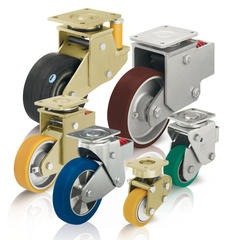
2. Application Scenarios: Tailored Solutions for Industry Pain Points
(1) Food & Pharmaceutical Industries
White nylon caster wheels comply with FDA hygiene standards, withstand sodium hypochlorite disinfection, and resist bacterial growth.
Recommended model: SEB series (full elastomer + ball bearings) for stainless steel carts in filling lines.
(2) Heavy-Duty Logistics & Warehousing
Nylon-coated cast iron wheels (NYB series) support over 5,000 lbs for container transfer carts or aviation cargo handling.
Paired with double-row ball bearings for smooth steering on uneven surfaces, eliminating “jamming” risks.
(3) Precision Electronics & Medical Equipment
Damping noise-reduction models (nylon core + rubber ring) operate at <65dB, protecting sensitive instruments like MRI machines.
Anti-static formulations (surface resistance 10⁶-10⁹Ω) prevent ESD hazards in chip manufacturing workshops.
⚠️ Limitations: Nylon wheels may embed debris on gravel surfaces causing instability, and prolonged use above 120°C may cause deformation. For such scenarios, consider polyurethane aluminum-core wheels or full cast iron wheels.
3. Manufacturing & Quality Standards: Identifying High-Reliability Products
Performance variations stem from material formulas and processing techniques:
Injection Molding Process
Premium pellets (e.g., Nylon 66) molded at 280°C ensure dense molecular alignment without bubbles or shrinkage.
Substandard recycled materials reduce load capacity by 50% and increase brittleness.
Bearing System Design
Bearing Type Load Capacity Maintenance Typical Applications Precision Ball Bearing <3,000 lbs Maintenance-free Medical carts, shelving Tapered Roller Bearing 3,000–8,000 lbs Periodic greasing Heavy cages, machine bases Composite Bushing <800 lbs Low-cost replace Light-duty storage racks Industry Certifications
ISO 9001: Quality management (e.g., Muvall, Blickle).
DIN 7172: European fatigue test standard (100,000 rotations without failure).
4. Technical Selection Table: 4 Steps to Identify the Optimal Model
Match parameters to equipment conditions to avoid over-engineering or failure:
| Selection Dimension | Key Parameters | Calculation Example |
|---|---|---|
| Load Capacity | Single wheel load = (Total weight × 1.2)/Number of wheels | 2-ton equipment with 4 wheels → ≥600kg/wheel |
| Wheel Diameter & Width | Diameter↑ → Obstacle clearance↑; Width↑ → Stability↑ | Choose Ø≥150mm, width≥50mm for uneven floors |
| Temperature Compatibility | Nylon 6: -30°C~80°C; Nylon 66: -56°C~121°C | Select Nylon 66 + low-temp grease for cold storage |
| Steering System | Rigid (straight-line efficiency) vs Swivel (flexible steering) | Use “2 rigid + 2 swivel” for hand carts |
Case Study: Automotive production line cart (1.8 tons total, epoxy floor, 6 hours daily operation)
Recommended solution:
Model: CC Nylex-8-1/2 (Nylon 66 wheel, Ø200mm, 2,000 lbs/wheel)
Bearing: Tapered roller bearing (withstands frequent steering impacts)
Mount: Galvanized steel + dual-brake swivel (anti-rust + parking stability)
5. Nylon vs. Other Materials: Data-Driven Comparison
Performance matrix for optimal material selection:
| Property | Nylon | Polyurethane | Rubber | Forged Steel |
|---|---|---|---|---|
| Max Load/Wheel | ★★★ 10,000 lbs | ★★☆ 5,000 lbs | ★★☆ 3,000 lbs | ★★★ 20,000 lbs |
| Floor Protection | ★★★ (mark-free) | ★★★ (mark-free) | ★★☆ (light mark) | ☆ (floor damage) |
| Chemical Resistance | ★★★ | ★★☆ | ★☆☆ | ★★☆ |
| Shock Absorption | ★★☆ | ★★★ | ★★★ | ☆ |
| Wet Surface Traction | ★★☆ | ★★★ | ★★★ | ★☆☆ |
Conclusion:
Quiet operation + floor protection → Polyurethane wheels (30% higher cost)
Extreme loads + dry environments → Forged steel wheels (accept floor maintenance costs)
Balanced cost-performance → Nylon wheels (optimal overall rating)
6. Industry Innovations: Next-Gen nylon caster wheels Technologies
Composite Noise Reduction
Blickle’s GSPO series embeds rubber damping rings into nylon cores, reducing vibration by 40% for acoustically sensitive labs.IoT Integration
RFID-equipped casters monitor mileage, overload alerts, and optimize preventive maintenance.Sustainable Materials
Bio-based nylon (e.g., castor oil extract) reduces carbon footprint by 50%, complying with EU Reach directives.
Conclusion: Nylon Caster Wheels – The Invisible Driver of Industrial Efficiency & Cost Control
With high load capacity, corrosion resistance, and zero maintenance, nylon caster wheels form the backbone of mobility systems in food, pharmaceutical, and logistics industries. Precise matching of wheel size, bearings, and mounts can extend equipment lifespan by 30% and reduce operational costs.
Act Now




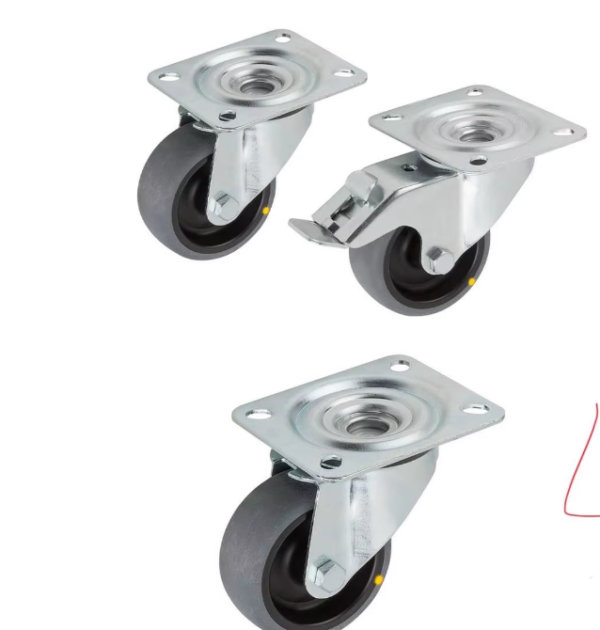
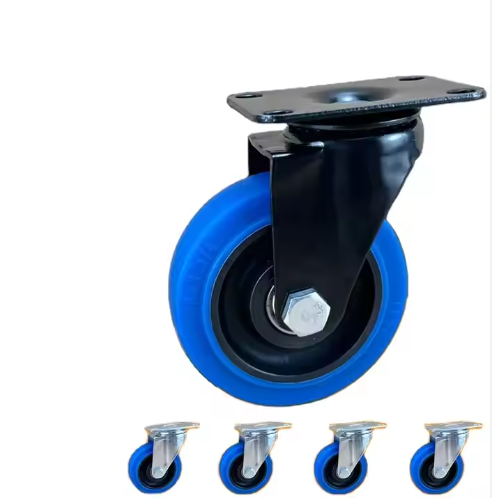
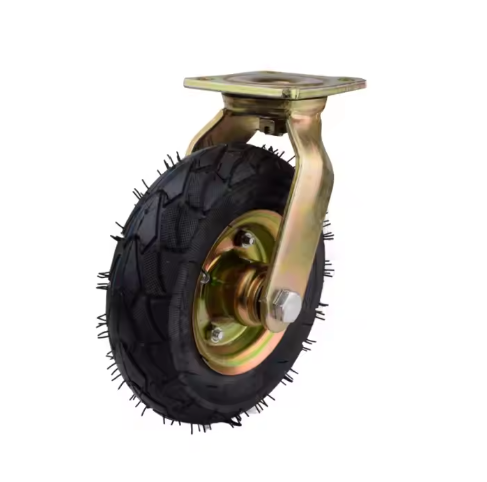
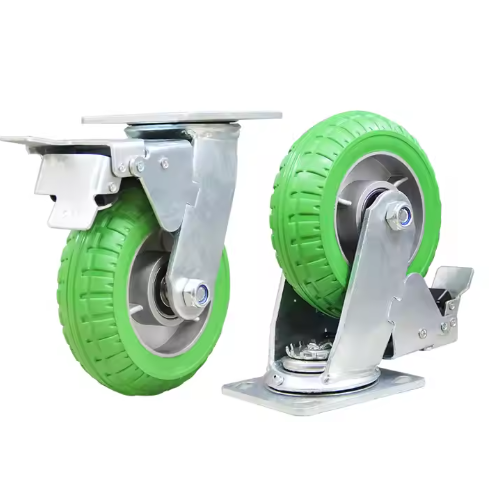
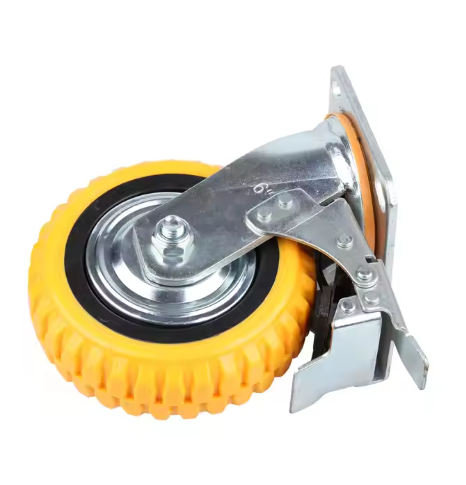
Reviews
There are no reviews yet.